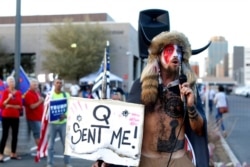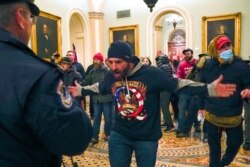The FBI remains “concerned” about the far-right QAnon conspiracy movement’s potential for violence and will soon release an unclassified threat assessment about the group, FBI Director Christopher Wray said Wednesday.
The FBI views QAnon as a “set of complex conspiracy theories largely promoted online, which has sort of morphed into more of a movement,” Wray testified before the Senate Intelligence Committee.
“And we’re concerned about the potential that (people’s vulnerability to QAnon) can lead to violence. And where it is an inspiration for federal crime, we’re going to aggressively pursue it,” Wray said.
Wray’s appraisal of the QAnon danger came during a hearing on the U.S. intelligence community’s annual assessment of myriad global threats facing the U.S. and its allies over the coming year. CIA Director William Burns and other top intelligence officials also testified during Wednesday’s hearing.
Wray told lawmakers that the bureau will “very shortly” send its threat assessment of QAnon to Congress. The unclassified report would offer a window into how the nation’s premier law enforcement agency views the danger posed by QAnon amid growing concern about far-right violent extremism in the wake of the Jan. 6 attack on the U.S. Capitol.
QAnon started out in 2017 as a baseless, online conspiracy theory that falsely claimed then-President Donald Trump was secretly battling a “deep state” cabal of Satan-worshipping pedophiles. But it has since gone global, drawing an assortment of conspiracy theorists.
Meanwhile, QAnon adherents have been involved in dozens of ideologically motivated crimes in recent years, including three murders, drawing law enforcement scrutiny. Wray said the FBI investigates violence and threats of violence, not the ideology that inspires it.
In 2019, the FBI for the first time singled out fringe conspiracy theories like QAnon as a potential domestic terrorist threat, warning that extremist activity inspired by these ideas could pick up during the 2020 U.S. presidential election campaign.
The warning proved prescient. QAnon adherents rallied around Trump during the campaign and then turned out in big numbers when supporters of the former president descended on the Capitol to disrupt congressional certification of President Joe Biden’s election. The rioting left five people dead, including Capitol Police officer Brian Sicknick and QAnon follower Ashlie Babbitt.
How many QAnon supporters took part in the Capitol breach remains uncertain. Wray said the FBI has arrested at least five “self-identified QAnon adherents” in connection with the attack.
But researchers have identified a larger number. According to the National Consortium for the Study of Terrorism and Responses to Terrorism (START) at the University of Maryland, the nearly 400 rioters criminally charged so far include 37 supporters of QAnon.
“Everyone in our data at a minimum made public statements in support of the conspiracy theory. And if that doesn’t count as self-identification as a supporter, then I don’t know what does,” said Michael Jensen, principal investigator for the program.
Asked how Wray arrived at the much lower figure, an FBI spokesperson said the bureau did not have anything to add to his comment.
Jensen said Wray is “justified” in sounding the alarm about QAnon’s potential for violence.
“However, it is important to note that risk of violence from QAnon supporters is likely not as great as it is from other types of domestic extremists, including white nationalists, who are responsible for dozens of attacks and hundreds of hate crimes every year,” he said in an email.
Colin Clarke, director of policy and research at the Soufan Group, said QAnon serves as a “force multiplier” for America’s far-right extremists.
“I think we're likely to see a migration of QAnon adherents into existing groups and even where they don't fold into groups that currently exist. I think as lone actors, they're dangerous in and of themselves,” Clarke said in an interview.






